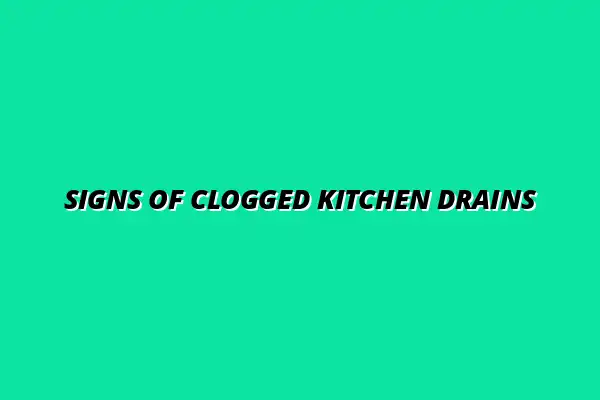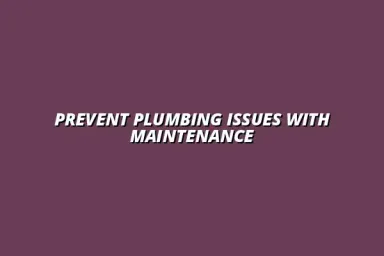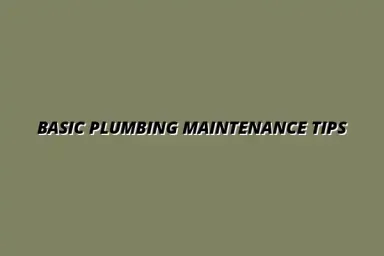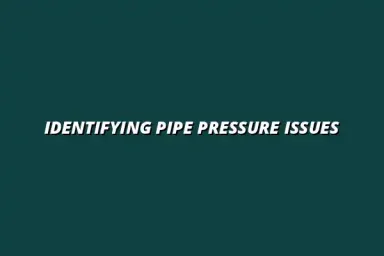Identifying Common Signs of Clogged Drain Pipes in Kitchens
Clogged drain pipes in kitchens can lead to a myriad of problems. These pipes are essential for directing waste and water away, ensuring that your kitchen remains clean and functional. Regular maintenance is crucial, as it helps prevent blockages and keeps everything flowing smoothly. For more information on maintaining your home’s plumbing, check out these essential plumbing maintenance tips.
Ignoring the health of your kitchen drains can lead to unpleasant situations. By understanding the importance of drain maintenance, you can head off potential issues before they escalate. This proactive approach can save time, money, and hassle in the long run!
Understanding the Importance of Drain Maintenance
Maintaining kitchen drain pipes is essential for a healthy home. They are responsible for carrying away food particles, grease, and other waste. When these pipes are neglected, the debris can build up, leading to clogs that disrupt your daily routines. Learning regular water pipe cleaning tips can significantly improve your home's plumbing health.
Regular maintenance not only helps to identify potential problems early, but it also ensures your plumbing system operates efficiently. Whether it’s using a drain strainer or performing routine cleanings, these small actions can prevent major headaches later on. Here are some key maintenance tips:
- Run hot water after using the sink to flush away grease.
- Use drain strainers to catch food particles.
- Regularly clean the traps and pipes.
Recognizing Early Indicators of Drain Issues
Being attentive to early signs of drain issues can save you from more significant problems. Some common indicators include slow draining, unusual sounds, and foul odors. If you catch these symptoms early, you may be able to address them before they escalate into bigger clogs. For quick solutions to common drain issues, explore these quick ways to unblock a sink.
Here are some signs that may indicate a problem with your kitchen drain pipes:
- Gurgling or bubbling noises when water drains.
- Slow drainage in your sink.
- Bad smells coming from the drain.
- Pooling water around the sink area.
Common Symptoms of Clogged Kitchen Drain Pipes
Unusual Sounds Coming from the Sink
Gurgling or bubbling noises are often the first signs of a clog. These sounds occur when air trapped in the pipes tries to escape, indicating that water isn’t flowing freely. If you hear these noises, it’s essential to investigate further!
Many homeowners overlook these sounds, but they can be a warning sign. Ignoring them can lead to more severe drain issues that require costly repairs. Addressing the problem early can save both time and money!
Slow Drainage in Kitchen Sinks
If your kitchen sink starts draining slowly, it’s a clear indication of a developing blockage. This gradual decrease in drainage speed is often the result of a buildup of food particles, grease, or soap scum. It’s important to act quickly before it worsens! If you're facing a clogged kitchen sink, this guide on fixing a clogged kitchen sink can be extremely helpful.
Keep an eye on drainage times, and if you notice changes, take action. Regularly cleaning your sink and using hot water can help maintain proper flow. Here are some quick tips:
- Flush your pipes with hot water weekly.
- Avoid pouring grease down the sink.
- Use vinegar and baking soda for a natural clean.
Unpleasant Odors Emanating from Drain
Foul smells from your kitchen drain can be a sign of trapped food or waste. These odors can be not only unpleasant but also a signal of deeper issues within your plumbing system. Addressing bad smells promptly can help maintain a fresh kitchen environment!
Here are some common sources of unpleasant odors in kitchen drains:
- Decomposing food particles stuck in the pipes.
- Grease buildup that has solidified.
- Clogged traps that need cleaning.
Water Backflow and Pooling
Water backflow is a serious issue that occurs when wastewater returns to the sink instead of draining away. This can happen due to clogs deep in the plumbing system. If you suspect a leak, learning how to detect hidden pipe leaks at home is crucial. If you notice water pooling around your sink, it’s a clear sign of a problem!
Backflow not only disrupts your kitchen activities but can also lead to unsanitary conditions. It’s vital to address this issue immediately. Regular maintenance can help prevent backflow by ensuring your pipes remain clear.
Frequent Need for Plunging
If you find yourself reaching for the plunger often, it’s time to take a closer look at your drain health. Frequent clogs can indicate deeper issues, such as a significant buildup or a problem with the plumbing itself. A proactive approach can help avoid these recurring issues.
Consider the following actions to minimize the need for plunging:
- Implement a regular cleaning schedule.
- Be mindful of what goes down the sink.
- Use strainers to catch debris before it enters the pipes.
Addressing Clogged Drain Pipe Issues Effectively
DIY Solutions for Minor Clogs
When it comes to small clogs in your kitchen drain, there are many simple DIY solutions you can try before calling for help. One of the most common methods is to use a plunger, which can often dislodge minor blockages. If that doesn't work, you might want to try a mixture of baking soda and vinegar, which can help break down grease and food particles.
Another handy technique is to use a plumbing snake. This tool helps to reach deeper into the pipes and remove stubborn clogs. Just remember to be gentle to avoid damaging your pipes!
- Use a plunger to create suction and dislodge clogs.
- Mix baking soda and vinegar for a natural drain cleaner.
- Employ a plumbing snake for tougher blockages.
- Boil water and pour it down the drain to dissolve grease.
Tools and Products for Drain Maintenance
Having the right tools and products at your disposal can make drain maintenance much easier. For starters, a good plunger is essential for clearing minor clogs. Additionally, a plumbing snake is a versatile tool that can help remove deeper blockages that a plunger cannot reach.
Many eco-friendly products can also aid in drain maintenance, ensuring you keep your plumbing systems working well without harmful chemicals. Consider using enzyme-based cleaners, which help to naturally break down organic material in your pipes.
- Plunger: A must-have for quick unclogging.
- Plumbing snake: Effective for deep clogs.
- Enzyme cleaners: Eco-friendly and safe for pipes.
- Drain strainer: Prevents food particles from entering the drain.
Understanding the Importance of Regular Maintenance
Creating a Routine Maintenance Schedule
Establishing a routine for drain maintenance can save you from many headaches down the line. I recommend checking your kitchen drains at least once a month. Make it a regular part of your cleaning schedule, so it becomes a habit! For serious plumbing issues, you may need to call a professional plumber in Birmingham.
During these maintenance checks, look for signs of buildup, unusual odors, or slow drainage. Taking quick action at the first sign of trouble can help you avoid more significant problems in the future.
- Check drains monthly for signs of blockage.
- Inspect for unpleasant odors and slow drainage.
- Clean the drain strainer regularly to avoid buildup.
- Perform deeper cleanings every few months.
Knowing When to Seek Expert Help
It’s crucial to recognize when a clog has become too serious for DIY solutions. If you've tried everything but the drain is still slow or backing up, it's time to call a professional. Persistent clogs can indicate larger issues within your plumbing system that require expert attention. Sometimes, issues beyond simple clogs require a specialized service; for example, a water heater that won't start needs a different approach.
Additionally, if you notice leaking pipes or water pooling under your sink, it’s best to seek help. Professionals have the tools and knowledge to identify and fix problems safely and effectively.
- Call a plumber if DIY methods fail.
- Look for leaks or water pooling as warning signs.
- Consider scheduling regular professional inspections.
- Seek help for recurring clogs to prevent further damage.
Final Thoughts on Clogged Kitchen Drain Pipes
Summarizing the Key Signs and Prevention Techniques
Throughout this article, we’ve explored various symptoms of clogged kitchen drains and how to prevent them. From unusual sounds to slow drainage, being aware of these signs can help you address issues before they escalate. Remember, regular maintenance and prompt action are your best defenses!
Additionally, the importance of routine checks and knowing when to call a professional cannot be overstated. Keeping your drains healthy is vital for a smoothly functioning kitchen!
- Listen for unusual sounds and observe drainage speed.
- Maintain a cleaning schedule to prevent clogs.
- Recognize when to seek professional help.
- Use eco-friendly products for maintenance.
Encouraging Proactive Drain Care
Taking action now can save you time, money, and frustration later! By adopting proactive drain care habits, you can keep your kitchen running smoothly. Start by implementing the tips we've discussed and create a plan for regular checks and maintenance.
Remember, a little effort goes a long way in maintaining healthy kitchen drains. You’ll be glad you took the time to care for your plumbing, ensuring a more enjoyable cooking and cleaning experience!

 Kiran Almasi
Kiran Almasi

